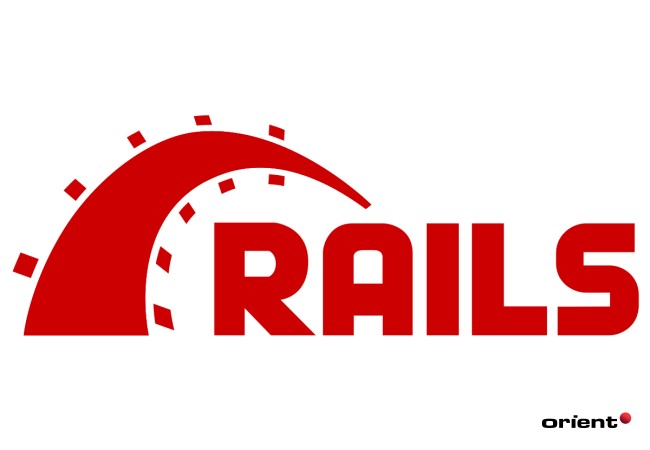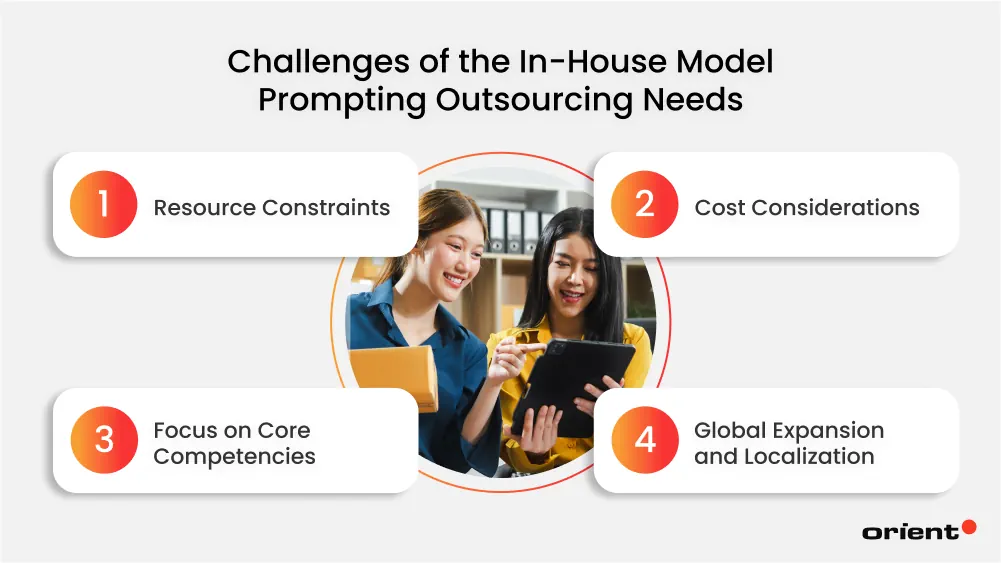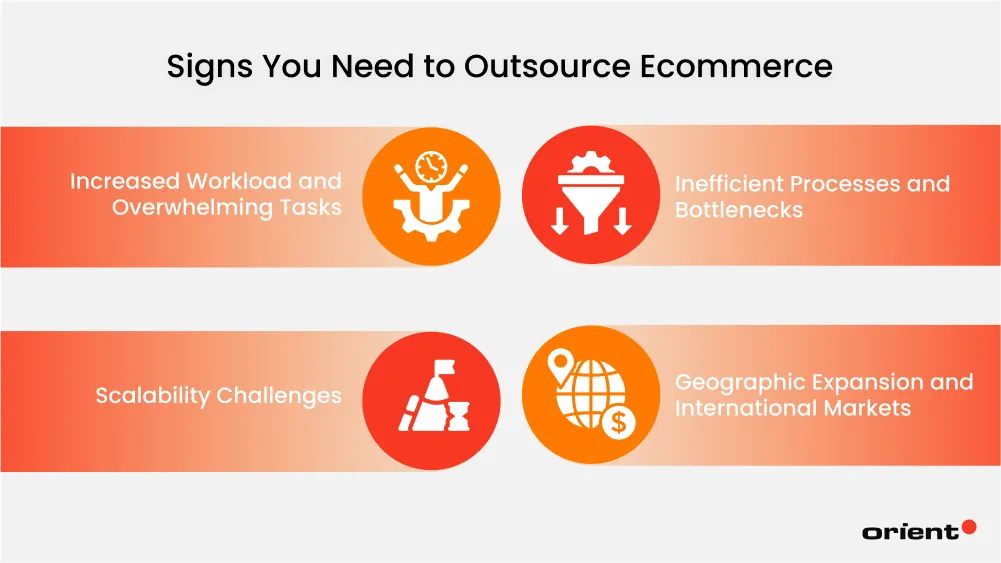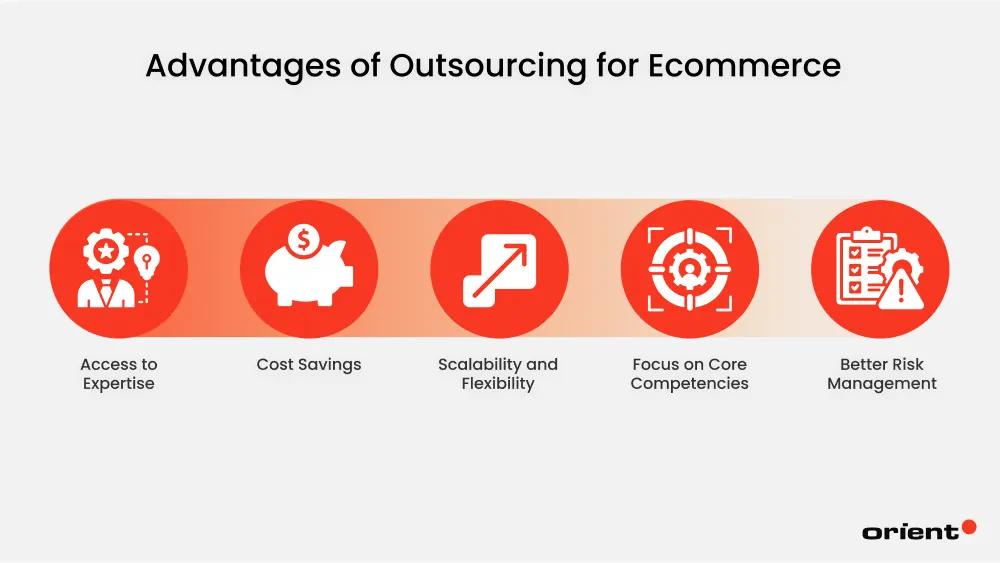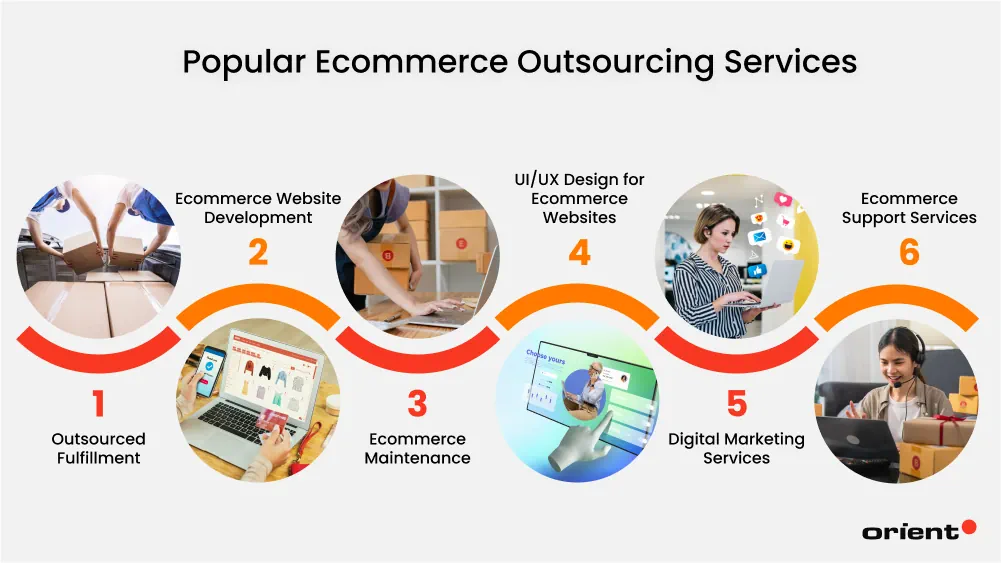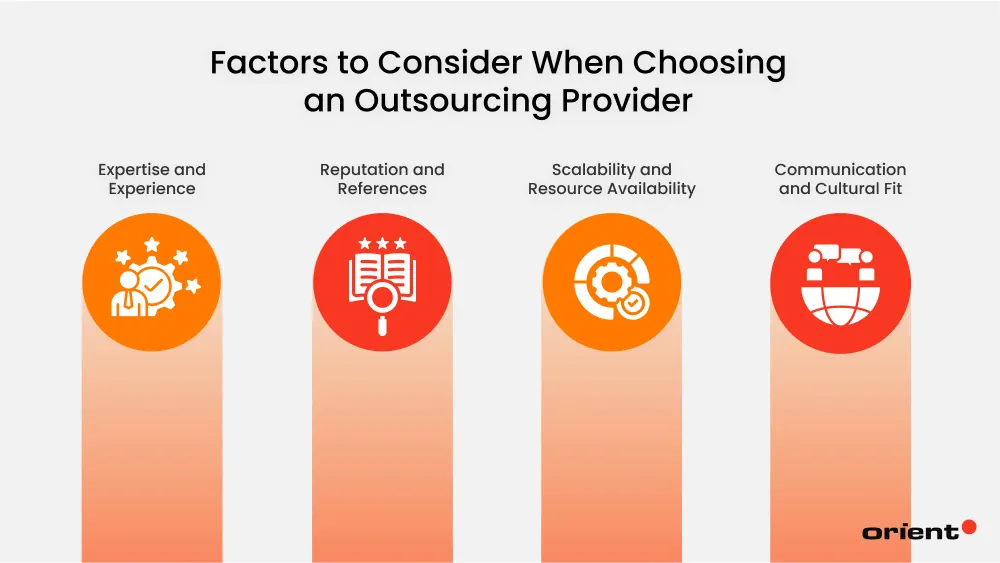Are you prepared to expand your business to the next level through e-commerce? In today’s fast-paced ecommerce businesses, the ability to scale your online business effectively can make the difference between thriving and getting left behind. As digital marketing continues to evolve and customer expectations soar, businesses must adapt and expand their operations to meet growing demands. Scaling becomes not just a desire but a necessity for success. That’s where the concept of outsourcing ecommerce companies comes into play.
Outsourcing ecommerce has emerged as a strategic solution for businesses aiming to scale rapidly and efficiently. By entrusting specific aspects of your online operations to external partners, you can tap into a wealth of benefits and resources that might otherwise be challenging to attain in-house. From cost savings and specialized expertise to scalability and enhanced focus, outsourcing ecommerce offers a promising avenue for accelerating growth.
So, if you’re ready to unlock new levels of growth and efficiency, let’s dive into the world of ecommerce outsourcing services and discover if it holds the key to scaling your business to unprecedented heights.
What Is Ecommerce Outsourcing?
![What Is Ecommerce Outsourcing?]()
Ecommerce outsourcing, or outsourced ecommerce, is a strategic business approach in which a company partners with a third-party service provider to handle various aspects of their ecommerce operations. Instead of managing all aspects of the online business in-house, businesses can delegate specific functions to specialized outsourcing companies. These functions typically include inventory management, order processing, and fulfillment, user experience design, ecommerce store or web development, application maintenance, outsourcing accounting, and data analytics.
There are different models of outsourcing e-commerce, ranging from selective outsourcing of specific functions to comprehensive end-to-end solutions. Businesses can choose to outsource one or multiple functions based on their unique needs and priorities. The outsourcing partner becomes an extension of the business, working collaboratively to ensure seamless integration and alignment with the company’s goals and values.
Challenges of the In-House Model Prompting Outsourcing Needs
![Challenges of the In-House Model Prompting Outsourcing Needs]()
While the in-house model of managing business operations has its advantages, it also comes with its fair share of challenges and limitations. These challenges can often prompt organizations to consider outsourcing certain functions to external partners. Here are some common challenges and limitations that may prompt the need for outsourcing:
- Resource Constraints: Scaling up operations and acquiring the necessary resources to support business growth can be challenging for in-house teams. Hiring and training new employees, investing in infrastructure and technology, and expanding physical facilities require significant time and financial resources.
- Cost Considerations: Maintaining an in-house team often involves substantial fixed costs, including salaries, benefits, office space, equipment, and ongoing training. Additionally, investments in technology upgrades and software licenses can be expensive.
- Focus on Core Competencies: In-house teams often have a range of responsibilities, including managing day-to-day operations, administrative tasks, and multiple functions. This dispersion of focus can dilute efforts and divert attention away from core competencies.
- Global Expansion and Localization: When venturing into new markets or regions, businesses may encounter challenges related to cultural nuances, language barriers, and local regulations.
Signs That Indicate It Is Time to Consider Ecommerce Full Outsourcing
![Signs That Indicate It Is Time to Consider Ecommerce Full Outsourcing]()
- Increased Workload and Overwhelming Tasks: If your ecommerce business is struggling to keep up with the growing demands of ecommerce operations, such as order fulfillment, inventory management, customer support, and website maintenance, it may be a sign that it’s time to consider outsourcing. Constantly feeling overwhelmed and falling behind on essential tasks can hinder your business’s growth potential.
- Inefficient Processes and Bottlenecks: If you notice bottlenecks or inefficiencies in your ecommerce processes, such as delays in order processing, slow website performance, poor UX/UI, or ineffective marketing campaigns, outsourcing certain functions can help streamline operations.
- Scalability Challenges: Rapid business growth or seasonal fluctuations in demand can put a strain on your internal team’s capacity. If you find it challenging to scale your operations and meet increasing customer demands efficiently, software outsourcing services can offer the flexibility and scalability required to adapt to market changes quickly.
- Geographic Expansion and International Markets: Expanding your ecommerce business to international markets comes with unique challenges, including language barriers, cultural differences, and local regulations. Outsourcing to partners with international experience and a global presence can provide valuable insights and support in navigating these complexities.
Advantages and Disadvantages of Outsourcing for Ecommerce
![Advantages and Disadvantages of Outsourcing for Ecommerce]()
Given the challenges and limitations discussed earlier regarding the in-house model for ecommerce, outsourcing ecommerce emerges as a viable solution that provides numerous benefits for businesses. The benefits of using ecommerce outsourcing services include:
Access to Expertise
Outsourcing ecommerce functions grants businesses access to specialized expertise. Outsourcing companies have a deep understanding of the intricacies of managing inventory, processing orders, and providing exceptional customer service. They stay updated with the latest industry trends, technologies, and best practices, ensuring that businesses benefit from their knowledge and insights.
Cost Savings
Ecommerce outsourcing can offer cost savings for businesses. By outsourcing functions, businesses can avoid significant upfront investments in infrastructure, technology, and labor costs. An outsourcing company often already possesses the necessary systems and resources, allowing businesses to leverage these without incurring additional costs. Moreover, outsourcing can provide economies of scale, reducing operational expenses and increasing efficiency.
Scalability and Flexibility
One of the key advantages of ecommerce outsourcing is the ability to scale operations quickly and efficiently. Outsourcing ecommerce businesses have the infrastructure and capacity to handle increased demands during peak periods without businesses having to invest in additional resources. This scalability allows businesses to meet key performance indicators, fulfill customer demands, expand their reach, and seize growth opportunities without the limitations of in-house constraints.
Focus on Core Competencies
Businesses may focus their attention and resources on their core capabilities by outsourcing non-core services. This enables them to devote more time and energy to strategic activities such as product development, marketing, and brand building. By aligning their resources with their core strengths, businesses can enhance their competitive advantage and drive overall growth.
Better Risk Management
Regulatory changes or data privacy and security threats due to technological advancements are some of the popular product risks, to name a few when operating a business. By partnering with an e-commerce service provider, you have an external partner with whom you can share certain operational responsibilities. Proficiency in cutting-edge technologies, the regulatory landscape of their respective regions, and best practices are the basis for offshore outsourcing companies to quickly resolve the above issues and better safeguard your processes from potential disruptions and vulnerabilities.
However, outsourcing in e-commerce also has its own limitations, mainly due to time and geographical barriers. Fortunately, these outsourcing disadvantages can be effectively mitigated as remote work becomes more prevalent, and technological advancements continue to evolve. The table below summarizes the advantages and disadvantages of ecommerce outsourcing.
| Pros of Outsourcing Ecommerce | Cons of Outsourcing Ecommerce |
|---|
| Access to expertise | Less control over development |
| Cost savings | Communication issues |
| Scalability and flexibility | Time zone differences |
| Focus on core competencies | Dependency on external teams |
| Better risk management | Hidden costs |
Popular Ecommerce Outsourcing Services to Consider
![Popular Ecommerce Outsourcing Services to Consider]()
- Outsourced Fulfillment: With an existing network of warehouses and distribution centers as well as other necessary technologies and materials, ecommerce outsourcing partners have the ability to fulfill orders on behalf of their customers. Order fulfillment services typically handle the entire logistics process of products, from order processing and inventory management to tracking shipments and processing returns.
- Ecommerce Website Development: These specialized services revolve around the process of developing a complete e-commerce app or website that meets the specific client’s technical requirements. Ecommerce app development provided by outsourcing vendors comes in two main forms: developing online stores or mobile apps using e-commerce platforms like Shopify and Magento or building a new custom ecommerce app from scratch. Whatever the type is, the third party will be responsible for your frontend and backend development, as well as setting up payment systems and integrating essential features.
- Ecommerce Maintenance: Ecommerce applications often encounter performance and security issues over time, which requires ecommerce businesses to regularly upgrade and maintain their systems. E-commerce app maintenance services provide routine updates, fixing bugs, monitoring performance, and installing security patches to help customers ensure the smoothness of their software products, even during high-traffic periods.
- UI/UX Design for Ecommerce Websites: Outsourced graphic design is a service that designs and improves an e-commerce business site with both visual and emotional appeal. By handling the visual aspects to an outsourced team, clients have time to focus on core competencies while keeping users on their websites longer, further increasing conversion rates.
- Digital Marketing Services: Digital marketing outsourcing involves hiring third party vendors to handle all the company’s marketing efforts including search engine optimization (SEO), paid advertising, email marketing, content creation, and social media management. The ultimate goal of this partnership is to attract more traffic and improve customer engagement.
- Ecommerce Support Services: Outsourced customer support teams will be the departments that handle customer inquiries through channels such as email, live chat, or call center and maintain customer satisfaction throughout the shopping journey. This is one of the popular forms of outsourcing as it helps ecommerce companies save resources and increase productivity.
How to Prioritize and Select the Most Suitable Functions for Outsourcing
Outsourcing ecommerce functions can be a strategic decision for businesses looking to optimize their operations, enhance efficiency, and focus on core competencies. Identifying the key ecommerce functions that are suitable for outsourcing involves understanding the different functions and their benefits, aligning them with business goals and constraints, and implementing a prioritization and selection process.
By considering these factors, businesses can prioritize and select the most suitable functions for outsourcing, aligning them with their goals, expertise, and resource constraints.
- Impact on Core Competencies: Assess which functions are core to your business and differentiate you from others in the market. Functions that are not core to your value proposition can be prime candidates for outsourcing, allowing you to focus on your unique strengths and competitive advantages.
- Cost-Benefit Analysis: Evaluate the potential cost savings and benefits of outsourcing each function. Consider factors such as economies of scale, specialized expertise, and efficiency gains. Prioritize functions that offer significant cost reductions or performance improvements when outsourced.
- Scalability and Flexibility: Consider the scalability and adaptability requirements of your business. Functions that require quick scaling during peak periods or expansion into new markets are good candidates for outsourcing e-commerce development, as outsourcing partners can provide the necessary flexibility and capacity.
- Risk Assessment: Evaluate the potential risks related to outsourcing each function, such as software security, quality control, and cultural fit with the outsourcing partner. Mitigate risks through careful evaluation, due diligence, establish clear communication, and monitor mechanisms.
How to Find the Right Ecommerce Outsourcing Partner
![How to Find the Right Ecommerce Outsourcing Partner]()
When considering ecommerce outsourcing, finding the right outsourcing partner is crucial for the success of your business. The following are some criteria for choosing an outsourcing partner:
- Expertise and Experience: Look for a partner with a proven track record and expertise in the specific ecommerce functions you are outsourcing. Assess their knowledge of industry best practices, technology proficiency, and experience in delivering successful outcomes in similar projects. Consider their understanding of your business domain and target market.
- Reputation and References: Evaluate the reputation of potential outsourcing partners by seeking client references, reading testimonials, and reviewing case studies. Look for partners who have established a positive reputation for delivering high-quality work, meeting deadlines, and maintaining strong client relationships. Consider their ability to handle confidential data and ensure data security.
- Scalability and Resource Availability: Assess the partner’s capacity to scale operations according to your business needs. Determine if they have the necessary resources, infrastructure, and manpower to handle your expected volumes and growth trajectory. Consider their ability to adapt to changing market conditions and technological advancements.
- Communication and Cultural Fit: Effective communication is crucial for a successful outsourcing partnership. Evaluate the partner’s communication channels, responsiveness, and ability to understand and align with your business values and goals. Consider cultural compatibility to ensure smooth collaboration and minimize potential conflicts.
The Bottom Line
Outsourcing ecommerce tasks can have a significant impact on business operations and growth. By leveraging the resources and expertise of outsourcing partners, the business owner can achieve operational efficiencies, reduce costs, and enhance customer satisfaction. Streamlined processes, accurate inventory management, effective marketing campaigns, and efficient order fulfillment contribute to improved productivity, reduced errors, and faster turnaround times.
If you are looking for an exceptional outsourcing partner for your outsourcing ecommerce website development, Orient Software stands out as an excellent choice.
Orient Software has earned a strong reputation for its technical proficiency, commitment to quality, and customer satisfaction. We have a team of skilled professionals who possess deep knowledge of software technologies, industry best practices, and emerging trends. Our ability to scale operations, adapt to changing market dynamics, and maintain effective communication makes us a reliable and flexible partner.
By choosing Orient Software as your ecommerce outsourcing partner, you can benefit from our extensive experience, collaborative approach, and commitment to delivering tailored solutions that align with your business goals. Our dedication to excellence, cultural compatibility, and focus on building long-term partnerships make us an ideal choice for businesses seeking reliable and capable outsourcing partners.
